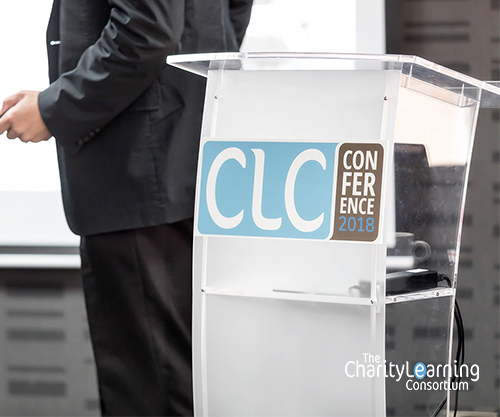This year’s annual Conference for members of the Charity Learning Consortium (CLC) took place in Pimlico, south west London, on 15th November. By strange coincidence, the eLearning Network (eLN) held one of its regular events on the same date – but in the City of London.
In previous years, such a ‘clash’ of prestigious events for those in the corporate (e-)learning world would have been unthinkable – not least because the industry couldn’t support both events in sufficient numbers to make each of them a success. Pessimists might say that this was, still, a challenging strategy, while those of a more optimistic nature will point out that this clash of events merely demonstrates that the UK’s corporate e-learning industry has grown in numbers and budgets to a size where it can justify two major events being run, successfully, on the same day.
For the potential delegate, however, the clash posed a dilemma. This writer eschewed the eLN’s offering of discussions about curation, xAPI and artificial intelligence in favour of the CLC’s exploration of how to avoid burnout, the power of purpose, winning relationships, storytelling in learning and the ‘Knowing-Doing Gap’. It was all brought together and co-ordinated – most ably – by Nick Hindley, Workforce Development Manager at Norfolk County Council.
The best-selling author and CEO of The Learning Architect, Liggy Webb, began the day by revealing that some 450m people in the world suffer from some form of anxiety or depression. She explained that people can become so focused on doing things for other people that they ignore the growing stress level that they’re experiencing.
To counteract this, Liggy offered a five-step model to ‘stress awareness’. The first step involves acknowledging that, although L&D people are ‘people people’ and want to please, no one has to do things for others. Liggy observed, “It’s not always about saying ‘no’. Sometimes you can say, ‘yes – but on my terms’.”
Liggy champions the benefits of eating and sleeping well, including drinking eight glasses of water a day – and 16 glasses on days when when you feel stressed. She also believes in taking rest periods, to allow you to get away from the stress for a while, at least, and advocates developing a predisposition to gratitude, since being grateful has been shown to increase people’s happiness levels.
In the afternoon, Gemma Critchley, of Aviva, explained the value of storytelling in a corporate learning context. She commented, “Marketers used to talk about a ‘call to action’. These days, we hear more about a ‘call to emotion’. If you associate an emotion with an event or a story, that event or story becomes more memorable – which is a key message for both L&D and marketing professionals.
“Stories are key in how we make sense of the world. Stories help us to learn,” added Gemma, who went on to explain the four principles of storytelling.
Dame Moira Gibb, among other things Chair of Skills for Care, explained how the Knowing-Doing Gap – a term coined by Stanford professors, Jeffrey Pfeffer and Robert I Sutton – can help to explain why, despite doing so much education and training, so little performance improvement results. In Dame Moira’s view, there’s:
- The separation of ‘knowing’ from ‘doing’,
- Talk as a substitute for action,
- Memory is no substitute for thinking,
- Fear that prevents us acting on our knowledge,
- Measurement that obstructs good judgement and
- Internal competition that turns friends to foes.
Moira’s tips for bridging the Knowing-Doing Gap are:
- Focus on ‘purpose’ – which had been the subject of a presentation by the ward-winning HR professional, Shakil Butt, earlier in the conference. Moira believes that we need a clear understanding of why we do what we do – and how we do what we do makes thing ‘better’.
- Recruit for values. Moira said, “Skills can be taught but values, such as honesty and taking responsibility, can’t be taught in that way. These values need to be pre-present at the recruitment stage – and their presence is what recruiters should be discovering.”
- Leaders at every level are role models for their team – and should recognise this and behave accordingly. Moira said, “Leadership is not dictatorship. Leadership is a more subtle art. Moreover, the leader who matters is a person’s immediate leader – so more of us are leaders than we might think. That knowledge should make all of us more ‘responsible’ in our behaviour.”
- Look outwards. “See how others solve similar problems to yours,” Moira advised. “Looking inwards – into your team and organisation – for solutions won’t work. We need to accept that others have things to teach us – and actively seek them out, to learn from them.”
Moira concluded, “Knowing about the Knowing-Doing Gap isn’t enough. It’s up to everyone to take action to reduce and, hopefully, eradicate it.”







Leave A Comment
You must be logged in to post a comment.